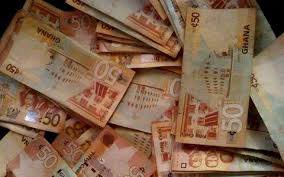 EIU has predicted a depreciation of the cedi by at least 4 percent
EIU has predicted a depreciation of the cedi by at least 4 percent
The Economist Intelligent Unit (EIU) has indicated the cedi will continue to lose value against major trading currencies, especially the US dollar, due to uncertainty over the 2020 general elections and low confidence in the financial sector.
In its country report on Ghana for May, the EIU said the cedi will further depreciate by at least 4 percent (using the present interbank forex rate of GH¢5.10) in the course of the year, averaging GH¢5.31 to US$1.
The report adds that the same trajectory will continue, mostly because of increased government spending in 2020—the election year—pushing the local currency to experience close to 13 percent depreciation, hitting GH¢5.86 to US$1 on average in the course of the year.
“The cedi weakened sharply over the first quarter of 2019, driven predominantly by large current account and fiscal deficits, low confidence in the financial sector, and increased political uncertainty before the 2020 elections. These dynamics will maintain downward pressure on the currency, with the cedi depreciating to GH¢5.31:US$1 on average in 2019.
“These dynamics will continue in 2020, with increased spending ahead of the election; we forecast that the cedi will depreciate to GH¢5.86:US$1 on average over the year.
“Domestic and global sentiment will improve in 2021-23, but we expect the cedi to depreciate further as the strong dollar and Ghana’s relatively weak domestic economic picture continue to weigh on the currency – although higher export revenue from increased oil earnings will provide some relief. We forecast that the cedi will weaken to an average of GH¢6.50:US$1 in 2023,” the report said.
The cedi’s weakened state against the US dollar has moved the Bank of Ghana to introduce measures it feels will curb the depreciation and make the local currency strengthened against its trading partners. Some of the measures include introducing the Ghana Interbank Forex Market Conduct, which, among other things spells out who is eligible to trade in forex in the country; how records should be kept and reported to the Bank of Ghana; and some general rules on the trading of forex.
In addition to this, the central bank has recently sent out a notice prohibiting the use of foreign currency in trading—including pricing, advertising and receipt or payment for goods and services in foreign currency in Ghana.
Commenting on the Ghana Interbank Forex Market Conduct as a means of curbing the cedi depreciation, financial analyst Dr. Richard Akwasi Atuahene, in an earlier interview with the B&FT, questioned the effectiveness of such a measure – saying it won’t bring the intended results.
“We cannot rejoice because of the forex market conduct. It is just to streamline the practice and procedure in forex trading.
“The reality on the ground regarding cedi-depreciation is supply and demand of the dollar. There is more demand than supply of forex after Christmas. In addition, the US interest rate shot up and so more people are disinvesting their long-term bonds and the Bank of Ghana needs to find dollars to pay.
“And again, now that the banks are publishing their accounts and declaring dividends, they will also demand dollars to pay dividends to their shareholders outside the country. So, these are the factors causing cedi-depreciation; and it has nothing to do with the interbank forex conduct,” he said.